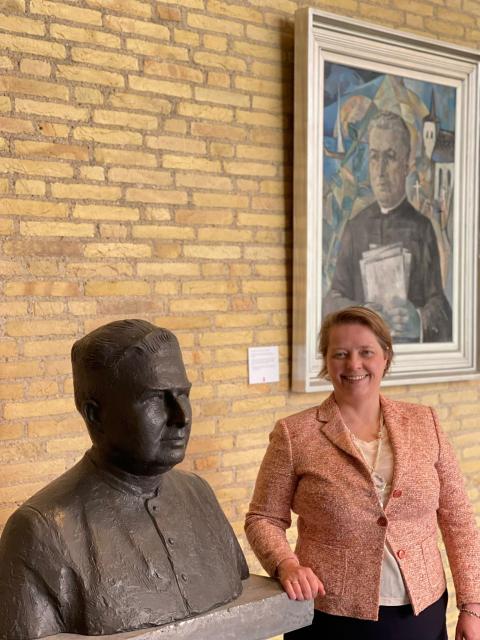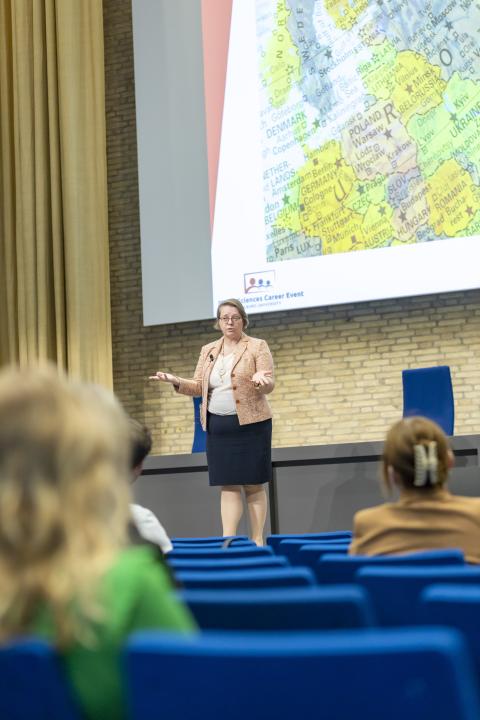Caecilia van Peski: Be a Lighthouse
That alumna Caecilia Johanna van Peski closely follows the Ukraine war is not only related to her current work for the Dutch Ministry of Defense on the topic of European Security and Cooperation. She previously served as an observer for the Organization for Security and Cooperation in Europe (OSCE) in Ukraine at the time of the seizure of Crimea and the outbreak of armed conflict in the Donbass. And she has Russian roots: her family name originated in the Russian town of Pyski. For her work, she visited many conflict zones, including Afghanistan, Tajikistan, Dagestan, Uzbekistan, South Korea, and countries in the Balkans, Middle East and Caucasus. She also worked for the EU, UN, NATO. What drives her, what are her values?

Between 2014-2016 Caecilia was stationed in Donetsk. “As observers from the OSCE, we were the eyes and ears on the ground for the international community. Every day we would travel in convoy to those places where during the night people had been killed by bombing. We slept under the roar of the guns, sometimes even in the bathroom because there were no windows there. Carpet bombing was also taking place then. What is different is that now there are sanctions in place and there is much more attention to what is happening because the war threatens us as well. And further, the Minsk Ceasefire Agreements were met with very little compliance by the parties involved. This raises fears about compliance with future agreements.”
We must guard against demonization
“With this war, Cold War sentiments, which were thought to be perhaps forgotten, are playing out again. We see moral boundaries being crossed and parties displaying diabolical behavior. In the process, opponents are sometimes portrayed as "un-humans”. During the war in Kosovo, where I still work today, the Kosovo Serbs said about the Kosovo Albanians that they turned into wild wolves in the evening, with red-hot eyes that lit up in the night. In turn, the Kosovo Albanians claimed that the Serbs cooked their children in pots and ate them. What I want to emphasize is that we must guard against this demonization, which has the potential to lead to escalation and greater disasters towards humanity. From home I have received a lot of Russian culture, language and history, which is enormously valuable. It helps to be able to empathize with what moves the other. Hopefully the Russian and Ukrainian displaced persons, who have now come our way, will help us to understand their views better.”
The war in Ukraine also affects Caeciliapersonally.“It hurts to see how Ukrainians who have managed to build a better life for themselves in recent years are now losing everything again. Yes, I am aware of the position I was in; if before patrolling there in the morning I took a nice fried egg for breakfast, with my flak jacket admittedly already ready next to me on the ground, but still a lot better protected than the locals. I am now being sent images by former colleagues and contacts in Ukraine, who write, 'This is what is left of our church, our office, our hospital, our store and our school. This is what is left of my home'. That pain inflicted on the victims of violence now does not go away easily, no matter how resilient the population involved, and will certainly be felt by succeeding generations.”
“With the outbreak of war, I suffer from the feeling that my own years of commitment to peace have been destroyed in one blow. Together we worked at the cutting edge, but our work in the UN, OSCE, EU, NATO, etc. often produced good results. Now all that has been built up has been swept away, thirty years of efforts for peace, security and solidarity, at least that is how it feels at the moment. And yes, that also affects my own sense of confidence. How are we as humanity going to get through this?”
I am not afraid
“I want to be in touch with the world, to engage with others. In doing so, I am not afraid. As a child I had little fear, not of exams, not of standing in front of a large audience, not of traveling to unknown places. With that I can also take on a leadership role, feel the power in me to do so. To keep your back straight, to rise above your own importance, to take the blows that you are going to get if you stick your head out above the ground. Where do I get my own resilience from? I may be a thinker, but I am also a physically inclined person. Earth, water, air and fire, I am sensitive to them and enjoy smells, colors, tastes. Inside me is a little animal that enjoys all these different textures. Life is there to be lived! When you are in that kind of unsettled area, you also live more intensely, every day feels like brand new. I don't think I'm a thrill-seeker, in the more hedonistic sense of the word. For me there is no bucket list and I'm not into motorcycling. On the other hand, there is something addictive about having your senses on edge, your brain working hard. It also gives me a sense of purpose in my life.”
”I come from a remonstrant pastor's family, where I received a lot of value. Love, intellectual baggage, insight into life and the vulnerability of people in the community we were part of and beyond. I received a lot without having to make an effort: nice parents, a good set of brains, health, beautiful things around me and from an early age a look across the borders. If you have the opportunity to help others get what you have, I think you have an obligation to do so. People who are less privileged, without having had any influence on it, are in many cases mainly concerned with survival. If your safety is guaranteed, if you have that luxury, then you can develop as a human being much better.”

Young people who I learn a lot from
In April, Caecilia shared her story with students during the Tilburg University Career Week.
”The contacts with young people, whom I call 'my students', regardless of whether I have actually taught them. Over the years, contacts were established through all sorts of international avenues. Some of these young people I work with know each other, some don't, but together they are a wonderful addition to my life. It is not charity or anything like that, because they are always young people who I learn a lot from, with whom I experience inspiring moments and in whom I recognize the same kind of fire that I experience in myself. I am the leader, they walk with me, they don't let go and gradually take over the baton. Invisible threads connect us, as they do all mankind.”
“I believe in protecting what is vulnerable. Everything of value is vulnerable. Human rights, human and animal life, life on our planet. Higher incomes should be taxed more heavily, people should be able to learn and study, there should be a lot of attention for mutual equality and the protection of our earth and habitat. For this, as far as I am concerned, it is necessary to work in a more active way towards a gradual decrease of the world population as a means for a better quality of life for everyone. Fundamentally, I believe that every human being should be allowed to develop to the fullest of their abilities. Liberal values as far as possible, respect for each other and for human limits where necessary. That should be the basis of society. As far as I am concerned, people should also be obliged to actively contribute to society, also by means of participation in the work force.”
Understanding to move forward together
“That idea of the importance of individual rights within the duties of the community I also recognized at my alma mater, Tilburg University, with its motto Understanding Society. I am a member of Friends of Cobbenhagen, Martinus Cobbenhagen was the founder of the university and a Roman Catholic priest, who believed that science should produce results that benefit society and improve people's lives. That idea fits me. Understanding Society is understanding to move forward together. That's a message from which a very strong solidarity and compassion comes.”
“In addition to the benefits I have enjoyed, I have of course experienced moments of pain and of sorrow in my life. Hard to digest grief at parting, detachment, illness and death. If you have experienced pain yourself, you often feel the pain of the other more strongly. All human beings may be seen, in their suffering and in their lives: untouchables on the streets of Dhaka, Bangladesh, outcast HIV-positive women in rural Uganda, lifelong convicts in massive prisons in the US. They too are creatures, living beings.”
“Have empathy and compassion, understand what pain is. See the other and also see the animal: realize how the animal is and how it suffers in the livestock industry. Carry out in your decisions that what you do should work out for the benefit of others. Establish a 'light' form of social service, which allows young people to gain experience outside the boundaries of their own household, together with their contemporaries. Be an example to others and don't be afraid! Be a lighthouse! People need examples, but advice is always quality plus acceptance, so think carefully about how you consult with others about values. There is no way to peace, peace is the way. Commit to a better earth!”
Big dilemmas in times that call for profound transitions
“We must stop this brutal war. Work on a ceasefire, right now! And I hope we can start rebuilding again, although that moment seems far away now. The question is how much solidarity can we then show to Ukraine again? In Germany they turn down the thermostat and call it 'Freezing for Peace'. And furthermore, there is a gigantic climate crisis in the background. These are big dilemmas in times that call for profound transitions. Let us together have the courage to escape from old patterns and look to a new future, one in which humans and animals will have it better than how we have had it. With climate security, a universal basic income, well-being from a more austere but also much more valuable base and equality.”
Date of publication: 16 May 2022
